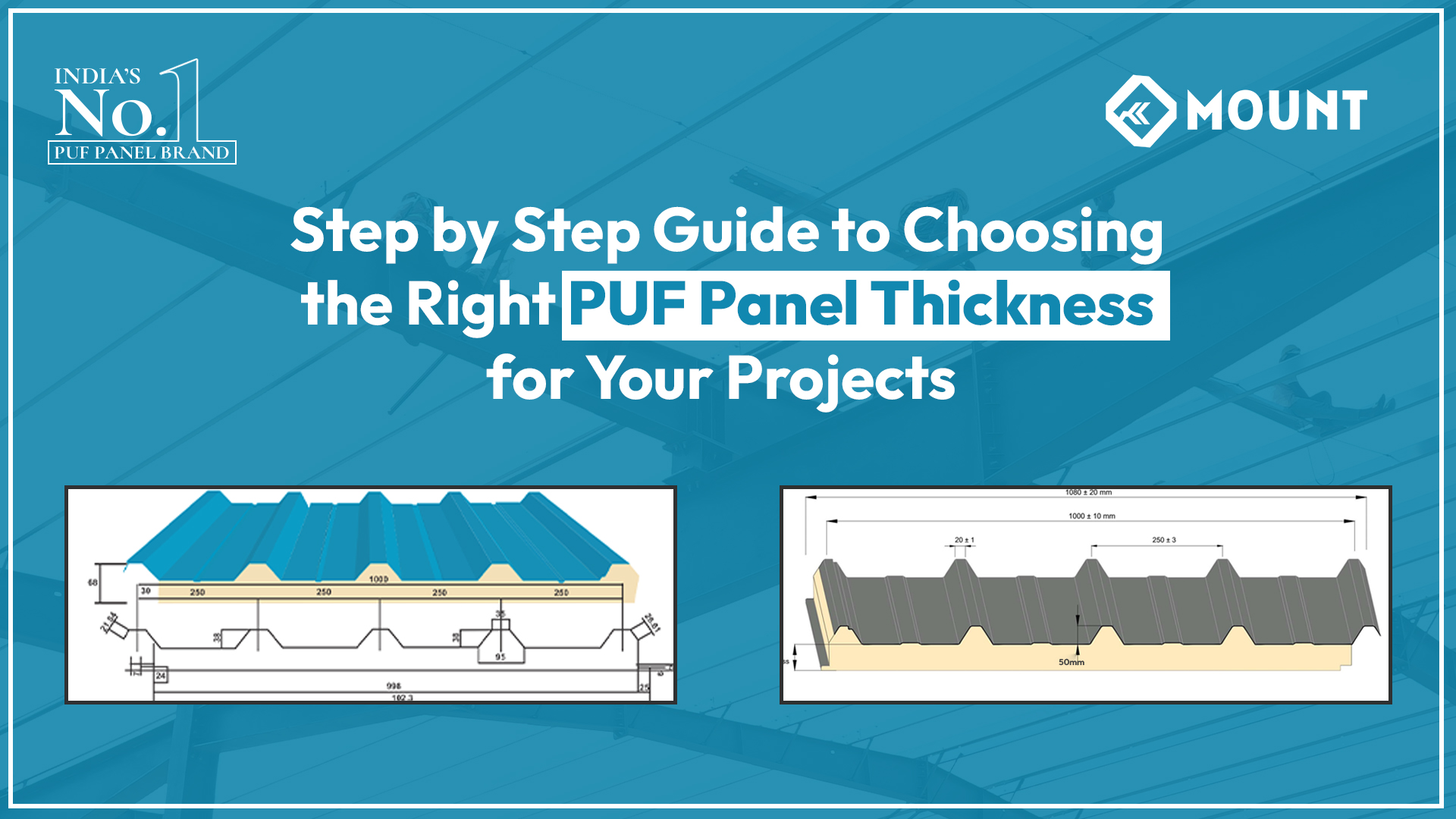
Step-by-Step Guide to Choosing the Right PUF Panel Thickness for Indian Projects
When it comes to building durable and energy-efficient structures in India, selecting the appropriate PUF roofing panel manufacturer is critical. Polyurethane foam (PUF) panels provide excellent thermal insulation, especially useful in India’s scorching summers and heavy monsoon rains. This guide helps you understand how to choose the right PUF panel thickness to meet your specific project demands, ensuring comfort, durability, and cost-efficiency.
Understanding PUF Panels and Their Importance
PUF panels consist of a core of polyurethane foam sandwiched between metal sheets, typically galvanised steel or aluminium. The core provides superior insulation properties, reducing heat transfer and protecting interiors from external weather extremes. Choosing the right PUF panel manufacturer like Mount Roofing ensures that you get panels designed to meet Indian climatic challenges while adhering to quality standards.
These panels are versatile and used extensively for roofing, wall cladding, and cold storage applications. Accurate thickness selection can significantly influence the panel’s thermal efficiency and structural integrity.
Why PUF Panel Thickness Matters for Indian Projects
The thickness of a PUF panel affects its insulation capacity and durability. Thicker panels provide better thermal resistance, which is crucial during India’s hot summers where indoor cooling costs can surge. At the same time, during heavy monsoon seasons, thicker panels offer enhanced protection against water ingress and structural weaknesses.
For example, Mount Roofing offers a variety of PUF sheets with thicknesses ranging typically from 30mm to over 100mm. Knowing the ideal thickness for your project ensures an optimum balance between cost and performance.
Factors to Consider When Choosing PUF Panel Thickness
- Climate Conditions: For hotter regions, opting for thicker Roofing PUF panels (50mm or above) delivers improved insulation and energy savings.
- Application Type: Wall panels may require different thicknesses than roofing panels, depending on structural and thermal needs.
- Load and Durability: Heavier panels can support greater loads and withstand physical impacts better, contributing to long-term structural stability.
- Budget Constraints: While thicker panels cost more upfront, their efficiency leads to energy cost savings that offset initial investments.
- Manufacturer Expertise: Selecting an experienced PUF panel manufacturer like Mount Roofing guarantees that the panels meet rigorous quality and safety standards.
Mount Roofing’s Offerings: Tailored Solutions for Indian Conditions
Mount Roofing and Structures Pvt Ltd specialises in manufacturing premium quality PUF panels that cater specifically to India’s diverse environmental conditions. Our product range includes 30mm, 50mm, and 100mm thick Sandwich PUF Panels designed for superior thermal insulation, durability, and weather resistance.
These PUF roofing panel thickness options are engineered using advanced techniques, ensuring lightweight, easy installation as well as long-lasting protection. With Mount Roofing’s panels, you gain advantages like:
- Enhanced energy efficiency
- Superior fire resistance
- Resistance to moisture and corrosion
- Customizable sizes for varied construction needs
Integrating PUF Panels in Your Indian Project
To optimize your building’s performance, collaborate closely with Mount Roofing’s experts to select the appropriate panel thickness. Factors such as building orientation, ventilation, and occupants’ comfort requirements will inform the ideal thickness decision.
Mount Roofing’s team offers consultations to assess your project’s needs and recommend the best PUF sheets that maximize insulation without unnecessary cost.
Energy Efficiency and Environmental Benefits
Using properly thickened PUF panels significantly reduces energy consumption for heating and cooling. This aligns well with India’s goals of sustainable construction and overall carbon footprint reduction.
Mount Roofing’s panels are manufactured with eco-friendly practices, ensuring no compromise between environmental safety and product quality.
Final Thoughts on Choosing the Right PUF Panel Thickness
Choosing the right PUF panel thickness is a pivotal decision that affects your project’s durability, energy efficiency, and long-term costs. Partnering with a reliable PUF roofing panel manufacturer such as Mount Roofing ensures access to high-grade products optimized for India’s unique climatic conditions.
From standard 30mm panels to heavy-duty 100mm options, your building can benefit from reduced energy expenses, enhanced comfort, and robust protection against weather elements.
Frequently Asked Questions (FAQs)
Q: What thickness of PUF panel is best for hot climates in India?
A. For regions with extreme heat, 50mm to 100mm thick PUF panels are recommended for effective thermal insulation.
Q: How does panel thickness affect energy savings?
A. Thicker PUF panels reduce heat transfer more efficiently, minimising cooling costs in summer and heating costs in winter.
Q: Are Mount Roofing’s PUF panels suitable for heavy monsoon areas?
A. Yes, Mount Roofing’s PUF panels have excellent water resistance and structural strength ideal for heavy rainfall zones.
Q: Can the thickness of PUF panels be customised?
A. Mount Roofing provides customizable panel thickness options to tailor insulation needs based on specific project requirements.
This guide highlights the expertise of Mount Roofing and emphasises the importance of selecting the right PUF panel thickness for Indian environments. Reach out to Mount Roofing today for personalized consultation and premium quality PUF solutions.


